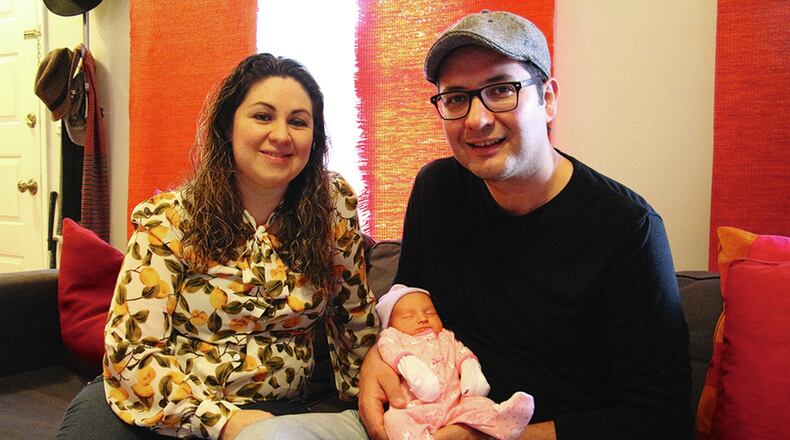After four years of marriage, Anna Gaxiola-Leal and José Alberto Leal decided they were ready to have a child. The road to parenthood, however, proved to be one filled with anguish and heartbreak for the couple.
A year and a half after their decision to become parents, the Leal’s received the news for which they had desperately been waiting: Anna was expecting a little boy, whom they named Joseph Alberto.
At 21 weeks gestation, however, Anna began having contractions. Her water broke, and her baby was unable to survive. Filled with questions and grief, Anna and her husband left the hospital empty handed.
After losing her child, Anna says she felt angry with the world.
“At first, I blamed my body for failing me. Then the doctors didn’t explain what happened, that maybe it had been cervical incompetence and that for another pregnancy we would take precautions. And finally, I was angry with God. ‘As much as I asked you for this, you give it to me and then you take it away,’” explained Anna.
One year later, the couple felt ready to try again and received the happy news that another child was on the way.
“But again, in the 18th week, taking things easy, my water broke. We go to the hospital, and it’s our luck that we get the same hospital room. They did an ultrasound, and they couldn’t find a heartbeat. I gave birth to my second baby, and once again, I had to return him to God. Return him to heaven,” explained a tearful Anna.
The couple’s heartbreaking story echoes that of many women in the United States. According to statistics from the Centers for Disease Control and Prevention, some 24,000 pregnancies end in loss in the U.S. every year.
Stigmas and misunderstandings
Pregnancy loss can be as painful as the death of a child after birth, said psychotherapist Marisol Mercado.
“The only difference is the person doesn’t have any life experiences with the child. But the stages an individual goes through after pregnancy loss are the same psychological stages that one goes through if the child were to die after birth,” she said.
.
People tried to offer condolences to the Leals but could not comprehend their pain.
“A lot of well-intentioned people say ‘you were only 18 weeks along,’ or ‘you’re so young, you’ll have another.’ But you don’t know until you go through this. Yes, I was only 18 weeks along, but from the moment I saw a positive pregnancy test, I was a mother. I already lived 100 lives with that baby. I saw it grow up, I saw it in my arms,” said Anna, who is originally from Mexico.
A promise fulfilled
When Anna and José lost their second child, they gave up on their dream. Years passed without another pregnancy. But the desire to be parents never went away — it grew stronger. Even so, the couple decided to, in Anna’s words, “leave things in God’s hands.”
They started the adoption process, but the couple’s plans were soon interrupted.
“We were in the adoption process, turning in our paperwork, when suddenly I feel very tired. I don’t know what’s going on. I feel strange, and it turns out I’m pregnant. Without planning it. In our minds and in our hearts, the wish was there, but we didn’t know it was going to be in that way,” assured Anna.
When they notified the adoption agency about the pregnancy, they were told that these types of circumstances are very common when couples are about to adopt.
For Anna and José, witnessing the birth of their daughter Annabella on March 6th, at eight months and without any complications, was a miracle they still cannot believe.
“It’s been 17 days, and I see her, and I still feel like she’s a doll, that they’re just loaning her to me and then I have to give her back to her real mother, like she’s not mine. I see her, and I say: ‘is she really ours? I don’t have to give her back?’ I smell her, I kiss her, and I still don’t believe it. It’s a dream,” said Anna.
What happens after pregnancy loss?
According to Mercado, after the loss of a pregnancy it is important to know that a natural grief process is coming, which is complicated when we resist accepting reality and when we don’t express our feelings.
“Understanding that grief is a natural process we must all face at some point, and knowing that with the passing of time – and I say time in general, not one year or two or five – we can expect that with time, emotions will calm, and we adapt to reality,” she added.
For Mercado, a native of Puerto Rico, it is important for women to understand that their value is not in whether or not they are mothers.
“For the women who are trying to have children and can’t, there has to be a new definition of feminine identify, and the order of priorities must change, because the reality is that not all women will become mothers, but it is possible for them to redefine where their value is,” she explained.
Anna recommends that those who face the same situation allow themselves to feel their grief, take comfort in their faith, and try to focus on something other than the circumstances.
“After the grief passes, find a purpose, like I did. Sow seeds in the lives of other women. Don’t focus on yourself, because in the end it fills you with bitterness, and nothing good comes from that,” said Anna.
About the Author

